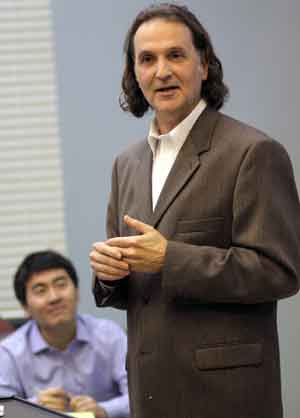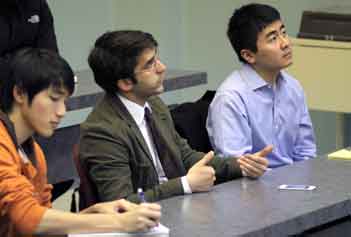The ‘golden age' of China’s economy has reached its end. The transition into the fifth generation of the country’s leadership calls for needed changes.
 "The China of my career is not the China of the future," said Ray Jovanovich ’84, a retired CIO of Amundi Asia who has lived in Asia for the past quarter century. "But analysts should welcome, not fear, a slowing Chinese economy."
"The China of my career is not the China of the future," said Ray Jovanovich ’84, a retired CIO of Amundi Asia who has lived in Asia for the past quarter century. "But analysts should welcome, not fear, a slowing Chinese economy."
Jovanovich addressed the issues China’s economy will face in its leadership transition.
“The rise of labor and the rise of consumption is the future of China,” Jovanovich said. “China’s economy can no longer sustain this one-dimensional nature of investment into manufacturing for exports. Effectively, this rebalancing is vital to the next 30-year stage for China’s economic development. They have reached the limits of the export model. The country has to evolve and embrace change.”
In the past 30 years, China thrived on its open-door policy, which Deng Xiaoping established in 1978. China’s economy has been in its ‘golden age’ since then, but reliance on excessive credit and low consumption rates have caused instability. China’s new generation of leadership now faces the challenge to develop a healthier, more stable market.
“Consumption is being dwarfed by the massive amount of investment that is being sponsored by the state, and this is unsustainable,” Jovanovich said. “This is why the change has to occur. You can’t continue to have this excess credit phenomenon which we have seen in China over the course of the past several years. So comprehensive social security reform and the stimulation of consumption are also the future of China, but it is a monumental challenge; it will take decades to evolve, but they will do it on their terms.”
The fifth generation of leadership will have difficulty making changes to the economy because it has less control over the nation than previous generations.
“The China of the next 30 years that I see is absolutely incumbent for another change in the direction of the country, and change is always difficult,” Jovanovich said. “It’s always difficult without strong leadership. The transition to the fifth generation, which will take place this year, brings new challenges for change. This fifth generation of leadership has, perhaps, less control than any previous generation. In fact, the ability to run China has become more complex and more complicated. So, the ability to assert authority is a major challenge for the fifth generation, and that is why this issue of implementing change in terms of rebalancing China is absolutely vital.”
China’s one-child policy has caused a “demographic nightmare.” The country is aging rapidly and is not wealthy enough to survive on low consumption and high savings rates.
“The reality is that there is no other future for China because of the evolving demographic nightmare,” Jovanovich said. “Within Asia, the demography runs the entire spectrum. Japan of course is a nation that is aging rapidly and is very old. But Japan is a wealthy nation with high savings rates and low consumption. China's demography, in many respects, is similar to Japan, but it is not as wealthy as Japan.
“The one-child policy has become somewhat of a restraint because now it is a demographic nightmare with the country aging so rapidly. And this I believe is what is driving the change and the willingness to embrace change because there is no other way forward given the way that demographic change occurred.”
 Jovanovich also discussed how international student programs encouraged by Deng contributed to the Chinese economy’s long term stability during its golden age.
Jovanovich also discussed how international student programs encouraged by Deng contributed to the Chinese economy’s long term stability during its golden age.
“The golden age was made possible by this embrace of change which Deng recognized,” Jovanovich said. “Deng embarked on a policy which was effectively similar to his own experience, and that is to allow the best and the brightest of the nation to go abroad, to be educated by the best universities that the west has to offer because he felt that this was another prerequisite for China’s future 50 years later. He also recognized that most of these students would not return to China over the first several waves that sought education beyond China because there was not an economic opportunity to return to China, but that over time there would be—that China would grow and develop. From his point of view—and this is what makes him a great statesman—is that he recognized that this was the way to accelerate the development of China, to ensure China’s rise.”
That message resonated to senior economics major Su Haoyuan. Su intends to return to China after either attending grad school or working a few years in the United States.
“I learned a great deal of information about the whole economy in China and a little bit about the investment strategies in China,” Su said. “I think Ray’s point of view is different from the majority of the investors and business magazines and newspapers. It is really fascinating because that is his personal experience.”